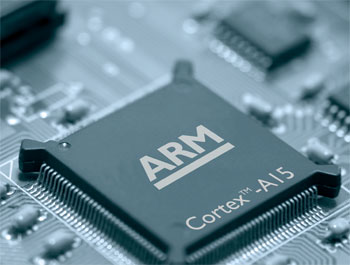On Tuesday, Cambridge-based chip designer ARM Holdings announced its quarterly profit beat all expectations, with third quarter pre-tax profits growing 22 percent, and revenue up 20 percent.
The company said it started the current quarter with a ‘record’ order backlog, caused by the popularity of its microprocessors in mobile devices.
Chips based on ARM designs power both the iPhone 5 and Galaxy S III, along with the majority of tablets and smartphones on the market. The company receives royalties from every product sold, as well as from its licensing agreements.
ARMed and dangerous
ARM is considered to be the dominant player in the mobile chip market, thanks to its energy-efficient designs and flexible licensing model. The company’s third-quarter pre-tax profits reached £68.1 million ($109m), as opposed to £67.4 million predicted by analysts. Its revenue also beat analysts’ forecasts – £144.6 million ($231.4m) instead of £140 million.
 The unexpected growth was mainly the result of more royalties, which ARM charges for the use of its designs. This source of revenue grew 25 percent. Licensing demand for the Cortex technology was also strong, with seven Cortex-A licenses signed in the quarter, helping total licensing revenue rise 15 percent.
The unexpected growth was mainly the result of more royalties, which ARM charges for the use of its designs. This source of revenue grew 25 percent. Licensing demand for the Cortex technology was also strong, with seven Cortex-A licenses signed in the quarter, helping total licensing revenue rise 15 percent.
“This demand has been driven by market leading companies choosing to deploy our technology. This has driven cash generation and record profitability,” ARM CFO Tim Score said in a statement.
“ARM is sensitive to some strong growth areas, like smartphones and tablets, and those of course are the parts of the industry that are growing much faster than the average.”
Meanwhile, the PC market has been struggling for several quarters, hit by a combination of economic uncertainty, the rise in popularity of mobile computing, and the anticipation of the Windows 8 release.
Last week, US semiconductor manufacturer AMD had lowered its fourth-quarter sales forecast and announced it would cut 15 percent of its staff in an effort to return to profitability. The situation at Intel wasn’t much better, with both income and revenue falling year-on-year. In the summer, the company entered the low-power mobile chip market with its Atom ‘Medfield’ design, but so far has failed to make an impact.
According to Reuters, shares in ARM rose 5.5 percent to £6.27 by 10:15am on the day of the announcement, topping the FTSE 100 leader board and reaching the highest levels since January. This values the UK company at over £8.3 billion.
Score said that even with lower than usual expectations for the Christmas period, the results in the third quarter would help the company exceed the current full-year prognosis.
It is thought that the popularity of the iPhone 5 has had a strong impact on the bottom line of the British company. ARM chips are present in all mobile devices currently made by Apple, and may appear in the ‘iPad Mini’, expected to be announced later today.
Analysts predict that in the next few years, ARM could become a strong player in the server market. Last week, Boston Limited brought the very first ARM server to the UK, based on the Calxeda chip.
How much do you know about microprocessors? Take our quiz!





